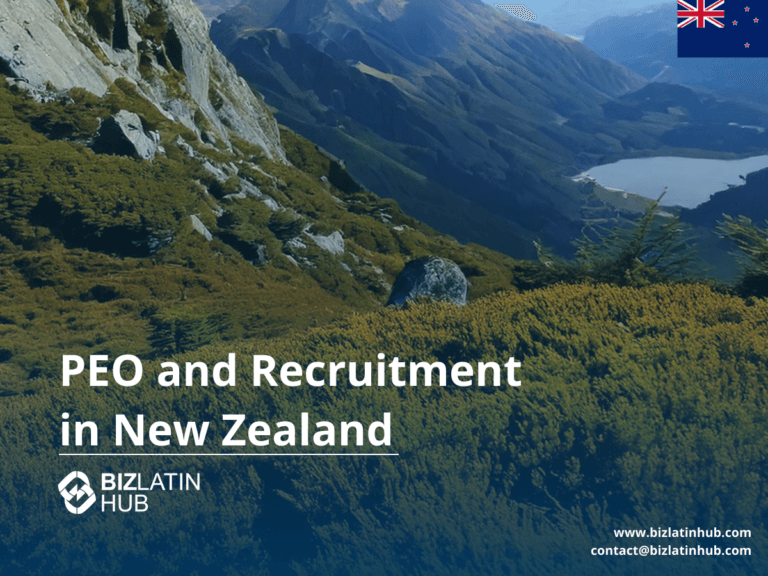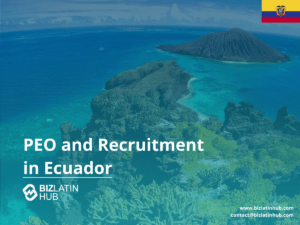A PEO in New Zealand is a valuable resource for testing market entry and establishing your business successfully. By managing critical HR functions, a PEO enables you to focus on scaling operations while remaining compliant. Collaborating with a trusted local partner is essential, and Biz Latin Hub delivers expert support with its extensive experience across Latin America and the Pacific. From market entry to company formation in New Zealand, we offer the services needed to help your business succeed in New Zealand and the wider region.
Key Takeaways
| Is it legal to hire in New Zealand through PEO services? | Yes in New Zealand PEO services are allowed. |
| What are the benefits of hiring through an PEO in New Zealand? | Hiring through a PEO in New Zealand provides quick access to the market without the need to establish a local entity, removing the headache of navigating unfamiliar labor and tax regualtions. |
| Steps to hire through a PEO in New Zealand | Step 1: Find The Right PEO For Your Company. Step 2: Create a “Client Service Agreement”. Step 3: Recruit Staff. Step 4: PEO Provides HR Services to Your Overseas Employees. Step 5: Operate Your Firm in Conjunction With the PEO |
| Why employ workers from New Zealand? | Hiring through an Employer of Record (EOR) in New Zealand streamlines market entry by handling HR, payroll, and compliance, enabling you to hire local talent efficiently and focus on business growth without setting up a local entity. |
What is a Professional Employer Organization (PEO) in New Zealand?
A PEO is a high-value service that supports small-to-medium enterprises (SMEs) outsource human resource requirements. A PEO can pay wages, take care of tax requirements and provide staff with employee benefits such as health insurance.
This gives your firm more time to focus on its growth, and benefit from outsourcing your human resources needs to experts. So how can your firm hire staff overseas through a PEO? First, you need to decide which PEO company you want to partner with.
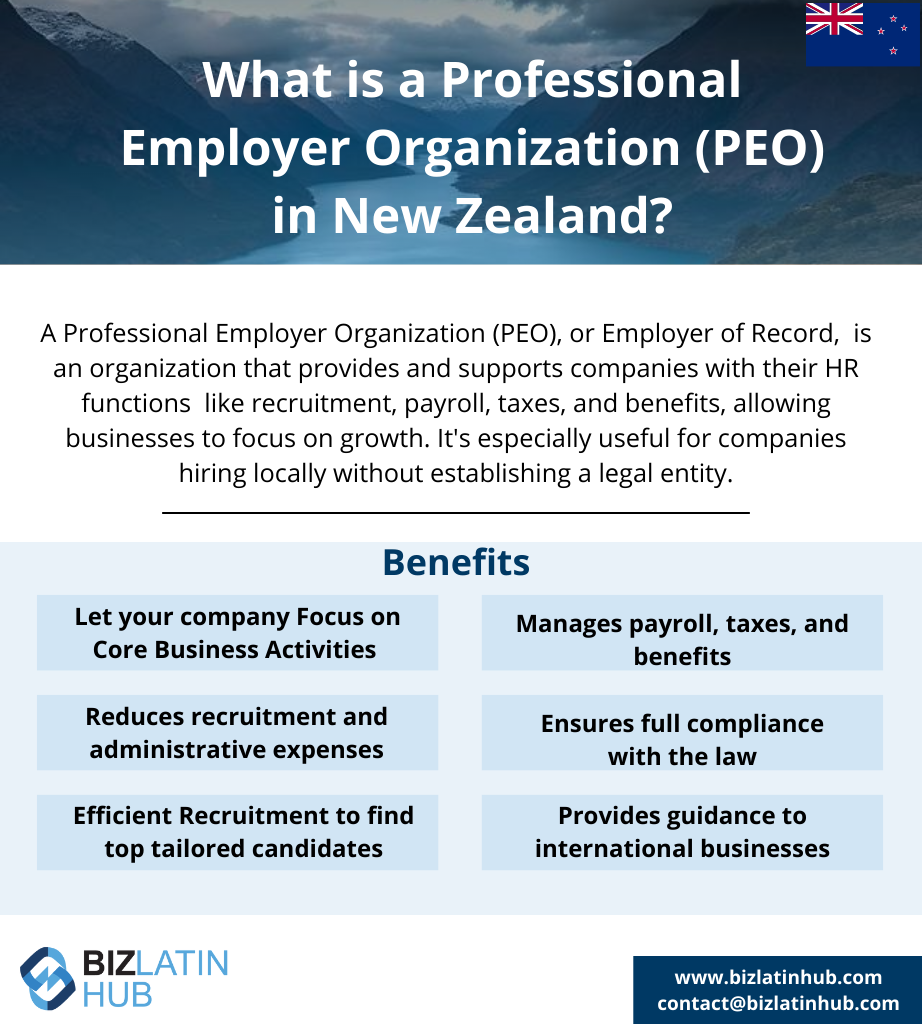
5 Steps to Follow When Needing a PEO for Your Company
When you are trying to expand your business and need the services of a PEO, you should follow these 5 steps:
- Step 1: Find The Right PEO For Your Company.
- Step 2: Create a “Client Service Agreement”.
- Step 3: Recruit Staff.
- Step 4: PEO Provides HR Services to Your Overseas Employees.
- Step 5: Operate Your Firm in Conjunction With the PEO
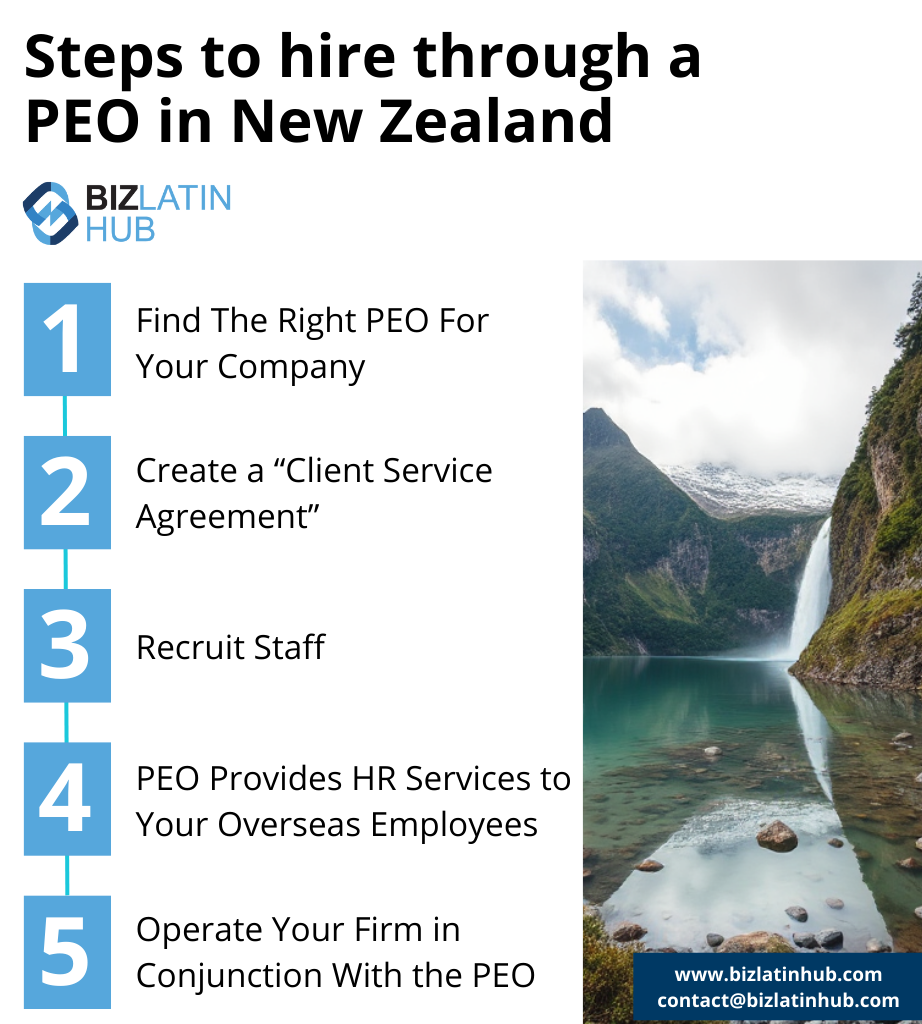
Step 1: Find The Right PEO For Your Company
To begin, consider your company’s needs. What services do you want to outsource? You may want a PEO to take care of payroll and onboarding, but your firm will take charge of finding employees to recruit abroad. Alternatively, you may want the PEO to source you a local employee in Latin America that fits your brief.
It’s important to research the different PEO options. They will take on a considerable role for your business. What experience do they have in your expansion country? A region as diverse as Latin America means experience in Mexico may not translate to Chile. You should consider the level of country risk and whether the PEO has resources to handle this risk.
Highly regulated countries will have more laws necessary to comply with, so you need to be confident in their capabilities to adequately provide for your firm. Check the PEOs client list to ensure its an appropriate provider for your firm, industry and country. Once you have chosen your PEO, you will form a service agreement.
Step 2: Create a “Client Service Agreement”
PEOs use a co-employment model to hire staff for your firm. The agreement will dictate the control you have of the employee and stipulate the responsibilities of the PEO. This will most likely include outsourced human resources requirements and payroll for tax and compliance purposes. The agreement will state what responsibilities are allocated to your business, and which to the PEO.
It’s important to note that the business retains management over the employees. Each client service agreement will look different as businesses will outsource different services. Once the agreement is formalised, the PEO can employ staff abroad.
Step 3: Recruit Staff
Depending on the services you outsource to your chosen PEO, you may already have found the staff member you want to hire. Alternatively, the PEO can take charge of recruiting staff in your expansion country and they provide candidates to your businesses. PEOs offer extra flexibility when you’re unsure of your expansion country, and employees can be recruited from all over Latin America.
Once the staff member has been approved, the PEO will then begin the hiring process, complying with all the applicable in-country legislation. The staff member will sign the co-employment contract which states what human resources responsibilities are assigned to the PEO, and the normal business operations responsibilities assigned to the parent company. PEOs are able to onboard foreign employees must faster and cheaper than businesses themselves.
Step 4: PEO Provides HR Services to Your Overseas Employees
Once the client service agreement is created and co-employment contract signed, firms can then operate with their employees in place, working overseas. Your business runs as normal at home, while your employee abroad is paid by the PEO. The overseas employee will also receive other staff benefits offered by the PEO. PEOs can offer localised support and advice to employees abroad. This is handy considering the physical distance and time zone differences.
- Employee benefits: Employees of SMEs can experience large enterprise employee benefits through a PEO. Due to economies of scale, PEOs can offer comprehensive health and dental insurance and to employees. SMEs can not usually afford such benefits. Employees receive better human resource services, training and health, educational benefits and safety manuals. Such benefits maintain a happier workforce.
Additionally, the PEO pays all the relevant taxes in your chosen country of expansion, so you can be assured that your firm is compliant. Businesses that outsource HR functions to a PEO generally have lower staff turnover.
Step 5: Operate Your Firm in Conjunction With the PEO
Now that your new employee’s HR needs are taken care of and they are working overseas, you can get on with your business at home. PEOs offer HR management systems and handle routine tasks so you have more time to focus on your business purpose.
A PEO can provide these services more cost-effectively, which is important for the firm’s budgets for foreign operations. As employee regulations differ from country to country using in-country experts saves time researching laws. This service lets the business focus on its core competencies, and benefit from outsourcing a business function.
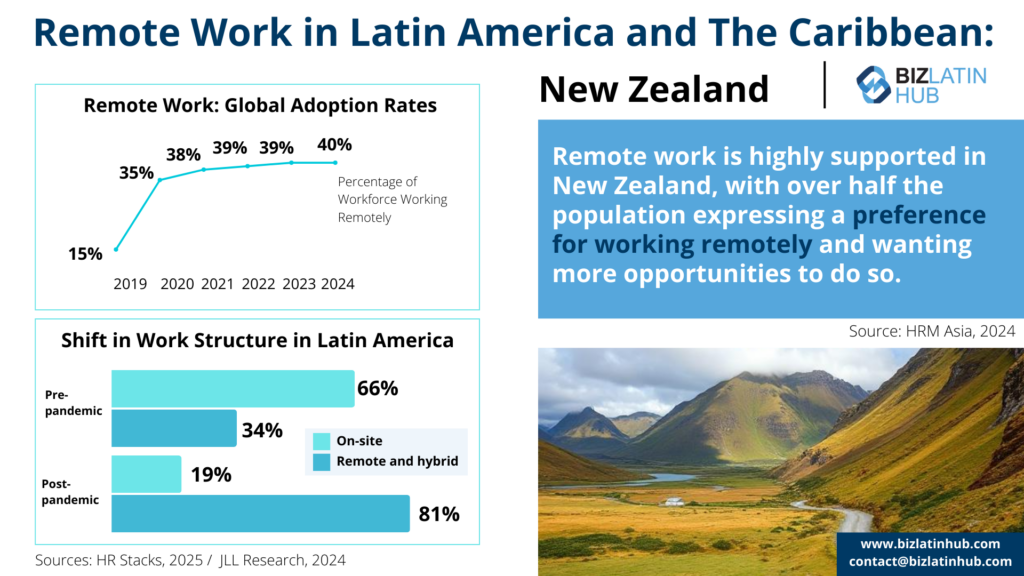
What will a PEO or professional employer organization in New Zealand do for you?
Hiring local staff through an employer of record in New Zealand eliminates the need to establish a local entity when conducting commercial activities for a short period of time and helps alleviate the burden of time-consuming HR tasks. These services include recruiting, hiring, terminating employees, managing payroll, and handling all taxes and social benefits for local employees, ensuring your business remains fully compliant with New Zealand’s local regulations at all times.
Additionally, with in-depth knowledge of New Zealand’s labor and tax laws, an employer of record will hire the most qualified and suitable personnel for your business while ensuring all employment contracts comply with current legislation. Some of the main benefits of working with an employer of record in New Zealand include:
- Employee Management: The employer of record will recruit the most suitable and skilled employees for your organization based on your specific requirements and resources.
- Legal Advice and Representation: Any claims or disputes involving your employees will be directed to the employer of record, which can represent your business and handle a range of legal issues related to employment.
- Time-Saving: Partnering with an employer of record in New Zealand saves you from navigating complex bureaucratic processes and reduces your administrative workload.
- Migration Advice: The employer of record can assist with navigating New Zealand’s migration system, including managing the process for business visas or residency permits for foreign employees, if required.
PEO vs. EOR in New Zealand – What’s the Difference?
When expanding into New Zealand, businesses often choose between a Professional Employer Organization (PEO) or an Employer of Record (EOR) to hire and manage employees.
- PEO (Professional Employer Organization): A service provider that supports companies with a local entity establishment and then managing payroll, benefits, and HR compliance. While entity setup requires initial time and investment, it offers greater stability, talent attraction, ability to build a long company culture and reduced permanent establishment risks.
- EOR (Employer of Record): A third-party provider that legally hires employees for companies, handling payroll, taxes, and compliance. It enables quick market entry without a local entity but may have limitations for long-term operations. EOR services are legal in New Zealand.
Note that PEO and EOR are often used interchangeably and, in some cases, may even mean the same thing, as their meanings can vary depending on context, local legal frameworks, and business local norms.
Important Tip: While an EOR provides a quick-entry solution, establishing a legal entity and working with a PEO typically offers greater control, long-term cost efficiency, reduced permanent establishment risk, stronger legal standing, and better talent attraction in New Zealand. Biz Latin Hub offers both PEO and EOR solutions, helping businesses navigate regulations, establish entities, and ensure full HR compliance. Whether you need a fast market entry or a stable long-term presence, we can guide you through the process.
FAQs on a PEO in New Zealand
You can hire an employee by incorporating your own legal entity in New Zealand, and then using your own entity to hire employees or you can hire through an Employer of Record (EOR), which is a third party organization that allows you to hire employees in the islands by acting as the legal employer. Meaning you do not need a local legal entity to hire local employees.
A standard New Zealand employment contract should contain the following information:
ID and address of the employer and employee
City and date
The location where the service will be provided.
Type of tasks to be carried out
Remuneration and bonifications/commissions (if applicable)
Method payment frequency
Duration of the contract.
Probation period
Work hours
Additional benefits (if applicable)
This will depend on the type of business and person you are hiring. Use our payroll calculator for more information.
The best decision depends on the needs of your company. Forming a legal entity has the following characteristics:
Slower to establish.
Permanent presence in the country.
All costs deductible through a local entity.
Ability to sign contracts and agreements locally.
Ability to invoice through local entity.
Legal entity compliance support required.
Hire employees directly.
A PEO works with your company as a co-employer, while a EOR is the legal employer of your employees. An EOR can provide more services than a PEO.
Why Invest in New Zealand?
New Zealand is a standout destination for investment, offering a stable economy, transparent regulations, and a pro-business environment. Known for its innovative approach and commitment to sustainability, the country provides exceptional opportunities in key sectors like agribusiness, renewable energy, tourism, and technology. Its strategic location in the Asia-Pacific region positions New Zealand as a gateway to rapidly growing global markets. With strong trade agreements, modern infrastructure, and an open economy, it’s an ideal hub for international business and investment.
What makes New Zealand truly unique is its emphasis on high-quality, sustainable products and services. Renowned for exports like dairy, meat, wine, and honey, the country’s agricultural sector is world-class. It also boasts a thriving eco-tourism industry driven by its stunning natural landscapes and environmental stewardship. As New Zealand continues to prioritize renewable energy and innovation, investors have the chance to engage with a dynamic, forward-thinking economy that blends growth with sustainability.

Biz Latin Hub can help you with a PEO in New Zealand
Whether you’re expanding into your first or your fifth country, an International PEO can help your organization expand its presence. Biz Latin Hub’s reach touches all key Latin American jurisdictions —and it can help you break into any one of these markets. For organizations that need agility and flexibility, partnering with an International PEO is absolutely the right move.
If you’d like to find out more information about whether or not an International PEO is right for your Latin American expansion, reach out to Biz Latin Hub today.

